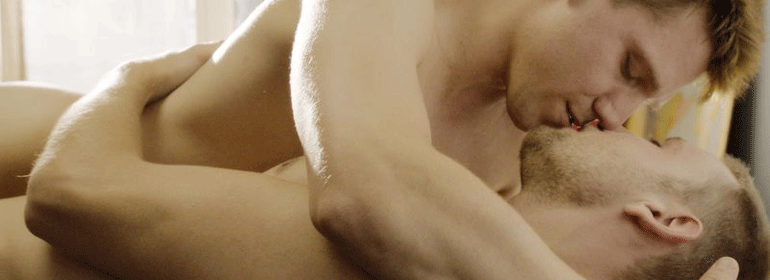German film ‘Free Fall’ explores sexual self-repression in modern liberal Germany, and is the best gay film to come to cinemas since Andrew Haigh’s ‘Weekend’, says Simon Mernagh.
Choosing between comfort and chaos is a central question of human existence. Are predictable lives with families, mortgages and the occasional glimmer of passion the ideal, or should we follow our more adventurous passions? Free Fall tackles that question head on, demonstrating the tragic agony of being stretched in both directions at once.
With a promising career in the police force, a baby on the way, and a fantastic haircut, Marc (Hanno Koffler) appears to have all the boxes ticked. However, the arrival of fellow trainee Kay (Max Riemelt) awakens within Marc a hitherto unknown sensation – namely, what it means to experience same-sex attraction. Torn between his burgeoning family with Bettina (Katharina Schuettler) and these newfound feelings for Kay, Marc’s comfortable life spirals into a free fall.
Director Stephan Lacant’s second feature breaks zero new artistic ground, yet treads old water with such effortless verve, grace and intelligence that any complaints of unoriginality or cliché are overridden by the sheer levels of craftsmanship on display.
Free Fall is garnering attention as the ‘German Brokeback Mountain’, but such comparisons are reductive. While both movies may revolve around the notion of forbidden gay love, Ang Lee’s 2005 film points an accusatory finger at conservative society. On the other hand, Free Fall is set in liberal, modern-day Germany, where Marc’s prejudiced co-workers are lampooned for their regressive behaviour.
Because of this, Free Fall examines the phenomenon of self-repression for the sake of perceptions of ‘normality’. Clearly interested in both men and women, Marc’s increasing discomfort with the heteronormative path he has chosen is palpable. Having moved next door to his parents’ house with his heavily pregnant girlfriend in tow, a horribly ‘comfortable’ suburban life looms on the horizon. Even mowing the lawn becomes too mundane for our poor protagonist.
The sizzling chemistry between Marc and Kay radiates through fight scenes and morning-after pillow talk alike, while Marc’s tender moments with Bettina grow progressively melancholic. Beautiful locations shot with some nifty camerawork from cinematographer, Sten Mende make Free Fall a visual treat. As with so many German movies, emotionally wrenching moments are captured matter-of-factly and without hyperbole; however, instead of feeling clinical, Lacant’s writing speaks for itself.
Although the film deals directly with the German police force, specifically a tactical riot division, obvious parallels can be drawn between the events of Free Fall and the strains of systematic homophobia which plague traditionally ‘masculine’ groups, such as the army or professional sports teams. Though Marc repeatedly (and lightheartedly) accuses Kay of being a “pussy”, Free Fall highlights this negative reaction to perceived ‘effeminacy’, which haunts so many macho institutions.
While not quite reaching the lofty heights of Andrew Haigh’s masterful Weekend, Free Fall cuts us a similarly refreshing slice of realistic gay romance. It’s a quieter, more subtle antidote to the bombastic queer stereotype all-too-often pushed to the forefront of mainstream cinema.
Book your tickets to see Free Fall here.
© 2014 GCN (Gay Community News). All rights reserved.
